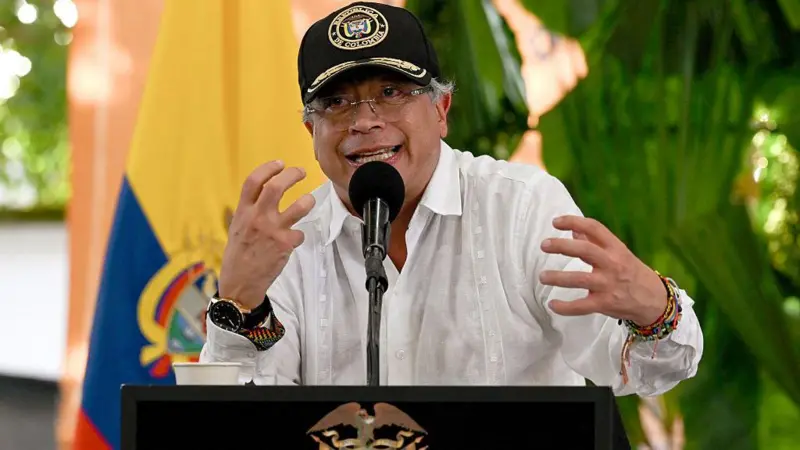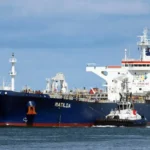
Petro and Trump have clashed several times in recent months. USA suspends payment of subsidies to the country
In yet another episode in the escalation of tension between the United States and Colombia, American President Donald Trump announced this Sunday (10/19) the suspension of “subsidies and payments” to the country and threatened the government of Gustavo Petro.
Through his social network, Truth Social, the Republican stated that, if the Colombian president did not put an end to what he called “extermination camps” derived from drug production, “the US would close them for him”, and “not in a kind way”.
“(Petro) is an illegal drug trafficker, strongly encouraging massive drug production, in fields large and small, throughout Colombia. This has become, by far, Colombia’s number one business, and Petro does nothing to stop it, despite large-scale US payments and subsidies, which are nothing more than a long-term fraud,” Trump wrote, without providing evidence for his accusation.
Petro responded, in a post on X, stating that the American president was being “deceived by his advisors”.
“I recommend that Trump observe Colombia carefully and determine which side the drug traffickers are on and which side the Democrats are on,” the text says.
The exchange of barbs came after Petro accused Washington, on Saturday, of violating Colombian sovereignty and allegedly killing a Colombian fisherman during an attack carried out in September against a vessel in Colombian territorial waters.
Also on Saturday, Washington repatriated to their respective countries a Colombian and an Ecuadorian, survivors of another attack carried out this week against a boat near the South American coast.
The US claims that military operations conducted in the Caribbean in recent weeks have represented a decisive blow against drug trafficking, but has not presented evidence that the at least 27 people killed in the attacks are drug traffickers.
The White House paved the way for the suspension of millions of dollars in military aid to Colombia in September, when the US withdrew the country’s certification as an “anti-drug ally”. The outage is the first in three decades.
Attack on Colombian vessel
For weeks, Petro had been making allegations that at least one of the multiple American attacks on boats in the Caribbean had been against a Colombian vessel with Colombians on board.
Until this weekend, the president claimed to be based on “evidence” to support his claim.
On Saturday afternoon, however, he made reference to a report published by state news agency RTVC which claimed that a Colombian fisherman named Alejandro Carranza was one of the victims of an American operation against a boat about a month ago.
“The boat attacked on September 16 was Colombian. It was adrift and had its distress signal turned on due to an engine failure when it was hit. Presumably, it was in Colombian waters. The person there was a long-time fisherman: Alejandro Carranza, who did not return home,” the Colombian president said on X.
“Alert the Attorney General’s Office. I ask them to act immediately”, he added.
The tone intensified in another publication: “US government officials committed murder and violated our sovereignty in territorial waters (…) We await explanations from the US government.”
The American response, for now, came with Trump’s strong warning and the suspension of financial aid to Colombia.
What is known about the two returnees
Also on Saturday, Petro confirmed the arrival of a Colombian repatriated by the USA. The man was believed to be a survivor of another attack on a crew this week, which resulted in the deaths of two people.
An Ecuadorian citizen who was on the vessel and survived was also repatriated.
“It was a great honor to destroy a large drug narco-submarine that was sailing toward the United States on a known drug trafficking route,” Trump said on his Truth Social platform, adding that the vessel was carrying fentanyl and other narcotics.
“Two of the terrorists have been eliminated. The two surviving terrorists are being returned to their countries of origin, Ecuador and Colombia, for detention and trial,” the Republican added.
Hours later, Colombian Interior Minister Armando Benedetti identified the Colombian as Jeison Obando Pérez, 34 years old.
“The Colombian repatriated by the United States, who was on one of the submarines attacked in the Caribbean, is already in the country receiving medical care and, as soon as he comes out of sedation, he will be prosecuted for drug trafficking,” Benedetti announced on X.
International law experts question the legality of US-led deadly attacks in the Caribbean, including those in which the victims were confirmed to be drug traffickers.
Since September, at least six vessels, most of them speedboats, have been attacked by the US in Caribbean waters, with Venezuela being the alleged origin of some of the crews.
The tension between Trump and Petro
Petro is a strong critic of the American military mobilization in the Caribbean and Trump’s policies.
In late September, he had his visa revoked after engaging in “reckless and incendiary actions” during a pro-Palestinian protest in New York.
Earlier that month, Washington removed Colombia from its list of allied nations in the fight against drug trafficking, but issued an exemption to maintain the country’s financial subsidy paid to partners in the anti-drug program, citing vital national interests.
For decades, the US has invested tens of millions in Colombia, a flow that could be interrupted with Trump’s announcement this Sunday, given without many details.
US attacks in the Caribbean are causing fear among local fishermen in Venezuela and Colombia | Federico Parra/AFP via Getty Images
The relationship between Colombia and the USA, considered by Washington as the most strategic in Latin America in the area of security, deteriorated under the administrations of Petro and Trump.
The two presidents have very divergent political views, which often clash.
In January, shortly after Trump’s inauguration, the two countries threatened each other with the possibility of a trade war due to the deportation flights that the US had been carrying out as part of the American president’s immigration repression policy.
In July, Washington recalled its chargé d’affaires in Bogotá, John McNamara, for consultations, to which Colombia responded by recalling its ambassador to the US, Daniel García Peña.
Some analysts interpreted the episode as a possible preamble to a break in diplomatic relations which, although not yet completed, shows signs that it could be underway.
Originally published by BBC News on 10/19/2025
By José Carlos Cueto – BBC News Mundo Correspondent in Colombia
Source: https://www.ocafezinho.com/2025/10/20/trump-chama-presidente-da-colombia-de-traficante-de-drogas-ilegais/

